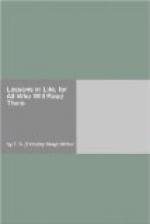“Your neighbour, over the way,” said the gentleman, “will make it for a dollar less than you ask.”
“Not of solid gold,” replied Mr. Grant.
“Oh, yes. I would have no other.”
Mr. Grant knew that the ring could not be made of fine, solid gold, for the price his neighbour had agreed to take. And he knew, also, that in manufacturing it, his neighbour, if he took the order, would fill up the centre of the ring with solder—a common practice. On the spur of the moment, he determined to do the same thing, and therefore replied—
“Well, I suppose I must work as low as he does.”
“The ring must be of solid gold, remember. I will have no other.”
“That’s understood, of course,” replied the jeweller; adding to himself, “as solid as any one makes them.”
The ring was manufactured at a reasonable profit, and the man got the full worth of his money; but not of solid gold. Silver solder composed the centre. But as the baser metal could not be detected by simple inspection or weighing, Mr. Grant felt secure in the cheat he had practised; and, quieted his conscience by assuming that he had given a full equivalent for the money received.
“He’s just as well off as he would have been if he had gone to my neighbour over the way, as he called him,” said he to himself, in the effort to quiet certain unpleasant sensations. “To suppose that he was going to get a solid ring at such a price! Does he think we jewellers steal our gold? Men will be humbugged, and there is no help for it.”
Yet, for all this, Mr. Grant could not cast out the unpleasant feeling. He had done a thing so clearly wrong, that no attempt at self-justification gave his mind its former calmness.
“The ring is solid gold?” said the man, when he came for it.
“That was the contract,” replied Mr. Grant, with a half-offended air, at the intimation conveyed in the tone of voice, that all might not be as agreed upon.
“Excuse me,” remarked the man, apologetically; “but I am very particular about this matter, and would throw the ring into the street rather than use it, if not of solid gold.”
“Gold rings are not given away,” muttered Grant to himself, as the man left the shop.
Some days after this transaction, a man named Harrison, who belonged to the church of which Grant was a member, met him, when this little conversation took place.
“I sent you a customer last week,” said Mr. Harrison.
Ah! I’m very much obliged to you.”
“A gentleman who wanted a gold ring. He asked me to give him the name of a jeweller upon whom he could depend. The ring, he said, must be solid, for a particular reason; and, as he was a stranger, he did not know who was to be trusted. I told him I would guaranty you for an honest man. That if you undertook to manufacture any article for him, he might rely upon its being done according to agreement.”




